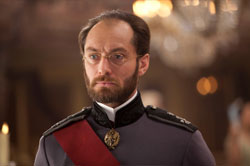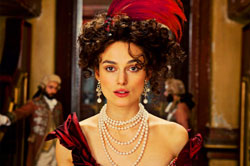Alter your reality
Anna Karenina is the perfect example of the faultless interpretation of a masterwork; you can almost see Tolstoy grinning at director Joe Wright and screenwriter Tom Stoppard's cheeky and daring vision, showing that the world is indeed a stage.
Setting it in a theatre, the film not only shows how high society of the St Petersburg of the 1870s lived their lives as if upon a stage, but also allows each character to use the stage as a showcase to hide their flawed perfection. The film is not set in any theatre, but a gorgeous decaying theatre, a fitting metaphor for Russian society at the time as it rotted from the inside.


The complexities of class, politics, moral behaviour and love
Wright masterfully interweaves themes and philosophies on the complexities of class, politics, moral behaviour and love in a highly stylised fictional theatrical reality that perfectly blends fantasy and reality in a wonderfully absurd fashion.
In Wright's Anna Karenina, theatrical action of St Petersburg's and Moscow's rarefied elitist circles, each character is on show, performing their given roles in society as they watch the world around them and, in return, they themselves are being scrutinised. Although this quirky idea might seem simplistic, it was a nightmarish challenge for the filmmakers and craftsmen who had to design and film 240 scenes, with 83 speaking parts naturally blended into the mix; this truly celebrates an epic masterpiece with dignity and flamboyance that might not be to everyone's taste, but once you connect with its magic, there's no letting go. In its current incarnation, Anna Karenina will bend, twist and challenge the way that you see film.
A spectacular visual feast and visceral experience
There are times when a character will enter onto an empty stage from the wings, then enter the auditorium that is not filled with seats, but rather a fully realistic train station with a snow-covered steam train rolling onto the platform populated by swarming crowds; the space equally transforms into a ballroom, countryside or offices; whatever the story demands is served up as a spectacular visual feast and visceral experience. Then there are times when a character who is standing on the empty stage will exit through the back of the stage, sliding open huge doors and exiting into a real snowy landscape. This doorway from fantasy to reality, and vice versa, is a unique tool that gives the classic tale a biting edge. What is equally impressive (and overwhelming), is that although the characters are vibrant and meticulously dressed in exquisite costumes, their emotional mindscape is completely void.
What we see is how others see them: perfection that knows no pain or tragedy; a façade of a human being that imprisons its humanity and feelings. You can almost hear the silent screams echoing from their smiling or veiled faces, or feel the pain when a tear smears their gorgeous make-up. The entire cast is radiant and excellent in their performances, perfectly balancing the contrasted realms of the different world with their conflicting emotional mindscapes.
Keira Knightley is sensational
In particular, the beaming Keira Knightley is sensational as the vibrant and beautiful Anna Karenina. Knightley is the quintessence of classic beauty, playing the wife of Karenin (Jude Law), a high-ranking government official to whom she has borne a son and whose social standing in St Petersburg is doomed after her scandalous extramarital liaison. Law is excellent as Karenin, with a dashing Aaron Taylor-Johnson as Vronsky, the sexy and devilish cavalry officer who steals Anna's heart.
The story focuses on the passionate affair between Anna and Vronsky, which scandalises St Petersburg society. Karenin is placed in an untenable position and is forced to give his wife an ultimatum. In attempting to attain happiness, the decisions that Anna makes pierce the veneer of an image-obsessed society, reverberating with romantic and tragic consequences that dramatically change her and the lives of all around her.
One of the most unforgettable moments in the film is the ballroom dancing scene, in which Anna succumbs to passion; Wright understands passion and knows how to seduce the senses.
The theatricality of Anna Karenina further emboldened Joe Wright to use music and choreography more imaginatively - and more frequently - than they are traditionally used in movies that aren't also musicals. Even the non-dance sequences were blocked out with choreographer Sidi Larbi Cherkaoui, who worked closely with not only the director, but also composer Dario Marianelli.
A delightful fresh feast
If you have grown tired of film that has lost its vigour, feeling like heated leftovers, Anna Karenina serves up a delightful fresh feast. It is a film that definitely provokes the imagination and stimulates the intellect, taking the imagination beyond traditional and conformist storytelling. It allows its audience to indulge fully in an illusion that reflects the allusions we mostly try to sift through our own reality.
Allow the absolute ingenuity of Wright, the sharp insight of Stoppard, and the skilful craftsmanship of the cast and crew to alter your reality.Anna Karenina guarantees to be the start of a whole new journey at looking at life (and film); it is a richly textured experience that celebrates the art of cinema at its most passionate and refined.
Behind the scenes
When gearing up to make a movie, director Joe Wright is known for his intense preparation work. The filmmaker actively collaborates with many of the same talented craftsmen and actors from movie to movie, which creates a familiarity and the feeling of a company of players - an important personal and professional link to the world of theatre he grew up in with his own family.
For Wright, this familiarity is a vital part of his movie-making process. He revealed:, "I find the whole process of making a film totally terrifying and so to have the support of people I feel loved and accepted by is really important; these are also people who I trust in terms of their creative and artistic sensibilities."
With the actors, Wright embarked on an intense cast rehearsal period of several weeks. Tom Stoppard visited one day and spoke to the actors at length, articulating how love suffuses the story. The screenwriter commented: "It was like social intercourse, but we were talking about work. I tend to feel timid in the presence of actors, who I think are brave."
Beyond character development and interacting with their fellow cast members, the actors were educated about Russian cultural life of the time through research presentations and discussions to help inform their understanding of the world their individual characters existed within. These included a seminar with Orlando Figes. "We were lucky to have him," said Knightley. "His speaking to us and then our reading his great book helped us understand the period and the culture better."
Read more at www.writingstudio.co.za/page4479.html
About Daniel Dercksen
View my profile and articles...